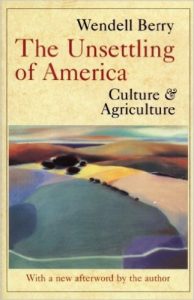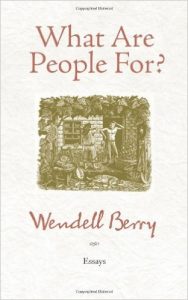Sister Society: Association Internationale Jacques Ellul
Sister Society: Association Internationale Jacques Ellul

Wendell Berry (born 1934) is a prolific author of novels, short stories, poetry, and nonfiction. He is best known for his critical essays and his environmental activism. Students of Jacques Ellul will find striking similarities between the two. For example, in an essay called “Discipline and Hope,” Berry critiques television as a means that imposes itself on its passive audience by creating images that “will not bear scrutiny.”[1] He goes on to say, “It is a politics of illusion, and its characteristic medium is pre-eminently suited…to the propagation of illusion.”[2] The same essay features the section headings, “The Kingdom of Efficiency and Specialization,” “The Kingdom of Abstraction and Organization,” and “Discipline and Hope, Means as Ends.” Despite their overlapping concerns and Berry’s year (1961) spent studying in France, there is no evidence that either directly influenced the other.[3]
Capitalism and War
 Like Ellul, Berry’s early disillusionment with capitalism and the advent of the atom bomb significantly shaped his attitudes toward industrialism and technology. In his 2012 Jefferson Lecture, Berry tells the story (which he inherited from his father) of the tobacco harvest of 1907. The American Tobacco Company had monopolized the industry, and Berry’s grandfather, a farmer, returned home from market with zero profit after transportation cost and commission fees were paid.[4] Additionally, Berry marks the end of WWII as the official turning point in USDA policy toward mechanization that has prioritized efficiency, minimized human agency, and produced an industrial food system that isolates and displaces smaller farms and rural populations. He sees a direct link between technologies of war and technologies of agriculture.
Like Ellul, Berry’s early disillusionment with capitalism and the advent of the atom bomb significantly shaped his attitudes toward industrialism and technology. In his 2012 Jefferson Lecture, Berry tells the story (which he inherited from his father) of the tobacco harvest of 1907. The American Tobacco Company had monopolized the industry, and Berry’s grandfather, a farmer, returned home from market with zero profit after transportation cost and commission fees were paid.[4] Additionally, Berry marks the end of WWII as the official turning point in USDA policy toward mechanization that has prioritized efficiency, minimized human agency, and produced an industrial food system that isolates and displaces smaller farms and rural populations. He sees a direct link between technologies of war and technologies of agriculture.
Technology
The most obvious commonality in the thought of Berry and Ellul is their similar critiques of technology. Berry claims that the chief aim of technological progress is an insatiable pursuit of greater efficiency and that human spontaneity and freedom will necessarily be sacrificed to this greater good. Furthermore, Berry argues that there is a tipping point, a limit of scale beyond which technology can no longer be contained by those who create it; it becomes autonomous. Berry writes, “They [works of technical invention] diminish us because…once we build beyond a human scale, once we conceive ourselves as Titans or as gods, we are lost in magnitude; we cannot control or limit what we do… If we have built towering cities, we have raised even higher the cloud of megadeath. If people are as grass before God, they are as nothing before their machines.”[5]
Politics in a Technological Age
Berry sees this drive toward technical efficiency as the dominant factor in all areas of life. Regarding the mechanization of politics, for example, he writes, “It is evident to us all by now that modern totalitarian governments become more mechanical as they become more total. Under any political system there is always a tendency to expect the government to work with mechanical “efficiency”– that is, with speed and no redundancy.”[6] In a later essay, he echoes Ellul’s frequently repeated concern that all things are political: “We must reject the idea — promoted by politicians, commentators, and various experts — that the ultimate reality is political, and therefore that the ultimate solutions are political….It seems likely that politics will improve after the people have improved, not before. The ‘leaders’ will have to be led.”[7]
Language in a Technological Age
Both men are concerned with the function and degradation of language in a technological age. Berry, as a poet, novelist, and English professor has devoted many pages and one collection of essays, Standing by Words, to the exploration of language and the role of the writer. In his essay, “In Defense of Literacy,” Berry argues that mastery of language is now taught as a specialization, and that “the schools…are following the general subservience to the ‘practical,’ as that term has been defined for us according to the benefit of corporations.”[8] Therefore, literacy is practical to the extent that the literate can efficiently function as an integer in a technological economy. He goes on to argue that true literacy, a knowledge of books and mastery of language, is the best defense against this industrial “language-as-weapon.”[9]
Pleasure Industries
 Berry has seen that our alienating and inhuman technological society has given rise to an industry of new techniques devoted to help further assimilate people into the technological system; Ellul calls this “human technology.” Our industrial economy, Berry argues, is devoid of true pleasure. He acknowledges, “that we support… a great variety of pleasure industries and that these are thriving as never before. “But,” he counters, “that would seem only to prove my point. That there can be pleasure industries at all, exploiting our apparently limitless inability to be pleased, can only mean that our economy is divorced from pleasure and that pleasure is gone from our workplaces and our dwelling places.”[10]
Berry has seen that our alienating and inhuman technological society has given rise to an industry of new techniques devoted to help further assimilate people into the technological system; Ellul calls this “human technology.” Our industrial economy, Berry argues, is devoid of true pleasure. He acknowledges, “that we support… a great variety of pleasure industries and that these are thriving as never before. “But,” he counters, “that would seem only to prove my point. That there can be pleasure industries at all, exploiting our apparently limitless inability to be pleased, can only mean that our economy is divorced from pleasure and that pleasure is gone from our workplaces and our dwelling places.”[10]
Violence
Following from their critiques of technology and their common Christian faith, both men advocate for pacifist approaches to violence and war. Berry writes in Blessed are the Peacemakers, “One cannot be aware both of the history of Christian war and of the contents of the Gospels without feeling that something is amiss. One may feel that, in the name of honesty, Christians ought either to quit fighting or quit calling themselves Christians.”[11] He provides further analysis of modern warfare as a product of industrialization: “Modern war and modern industry are much alike, not just in their technology and methodology but also in this failure of imagination.”[12] He clarifies, “In the face of conflict, the peaceable person may find several solutions, the violent person only one.”[13] Finally, Berry links violence in warfare with violence against the creation. He asks, “How would you describe the difference between modern war and modern industry — between, say, bombing and strip mining, or between chemical warfare and chemical manufacturing?”[14]
Differences
Finally, Berry and Ellul take diverging paths at some significant points. Some of the differences are a matter of emphasis. Berry, for example, is never as explicitly theological as Ellul. And while Berry is often known for his environmentalism and his writings on ecology, Ellul only hints at an implicit ecology in his critique of technology and capitalism. Despite Ellul’s own environmental activism and his brief time as a farmer, Bernard Charbonneau took the lead in addressing ecology head-on.[15]
Others differences are a matter of style. Berry’s thought, even on technology, is less systematic and rigorous and is rooted in his own experience in rural Kentucky. Perhaps the greatest rift between the two is their views of work. Berry is far more optimistic about the potential for work to be full of meaning and pleasure, while Ellul sees work as a necessary rather than good part of life in marred world.
If Ellul was concerned with the forest, that is, the big question about fate and freedom, history and eschatology, Berry strives to be only concerned with the trees, asking, “What has happened to the black willows that once grew along the Ohio River.”[16] Ellul was fond of the slogan “Think Globally, Act Locally.” Berry, on the other hand would counter, “Think Locally and Act Locally.” “Global thinking,” he says, “can only do to the globe what a space satellite does to it; reduce it, make a bauble of it. Look at one of those photographs of half the earth taken from outer space, and see if you recognize your neighborhood. If you want to see where you are, you will have to get out of your spaceship, out of your car, off your horse, and walk over the ground.”[17]

[1] Berry, Wendell. A Continuous Harmony: Essays Cultural and Agricultural (New York: Harcourt, Brace,1972), 91. Cf. Ellul’s treatment of images and words in The Humiliation of the Word.
[2] Ibid., 90.
[3] I have recently been assured by Wendell Berry, via personal correspondence, that he is not familiar with Ellul.
[4] Berry, Wendell. It All Turns on Affection: The Jefferson Lecture and Other Essays (Berkeley: Counterpoint, 2012), 9-10.
[5] Berry, Wendell. The Art of the Commonplace: The Agrarian Essays of Wendell Berry. Ed. Norman Wirzba (Washington: Counterpoint, 2002), 95-96.
[6] Berry, Wendell. Life is a Miracle (Washington: Counterpoint, 2000), 51.
[7] Berry, Wendell. Our Only World: Ten Essays (Berkeley: Counterpoint, 2015), 63.
[8] Berry, A Continuous Harmony, 169.
[9] Ibid., 172
[10] Berry, Wendell. What are People For? (New York: North Point, 1990), 139.
[11] Berry, Wendell. Blessed Are the Peacemakers: Christ’s Teachings about Love, Compassion & Forgiveness (Washington: Shoemaker & Harold, 2005), 4.
[12] Berry, Wendell. Sex, Economy, Freedom and Community (New York: Pantheon, 1992), 82.
[13] Ibid., 87.
[14] Berry, What Are People For?, 202.
[15] Daniel Cerezuelle compares the ecological thinking of Berry and Charbonneau here: http://agora.qc.ca/documents/agriculture_biologique–wendell_berry_et_bernard_charbonneau_par_daniel_cerezuelle
[16] Berry frequently raises this question to demonstrate the difference between “expert” or “specialist” knowledge that is abstract and aloof and his own knowledge which is personal, immediate, and historical.
[17] Berry, Sex, Economy, Freedom, and Community, 20.
___________________________________________________

